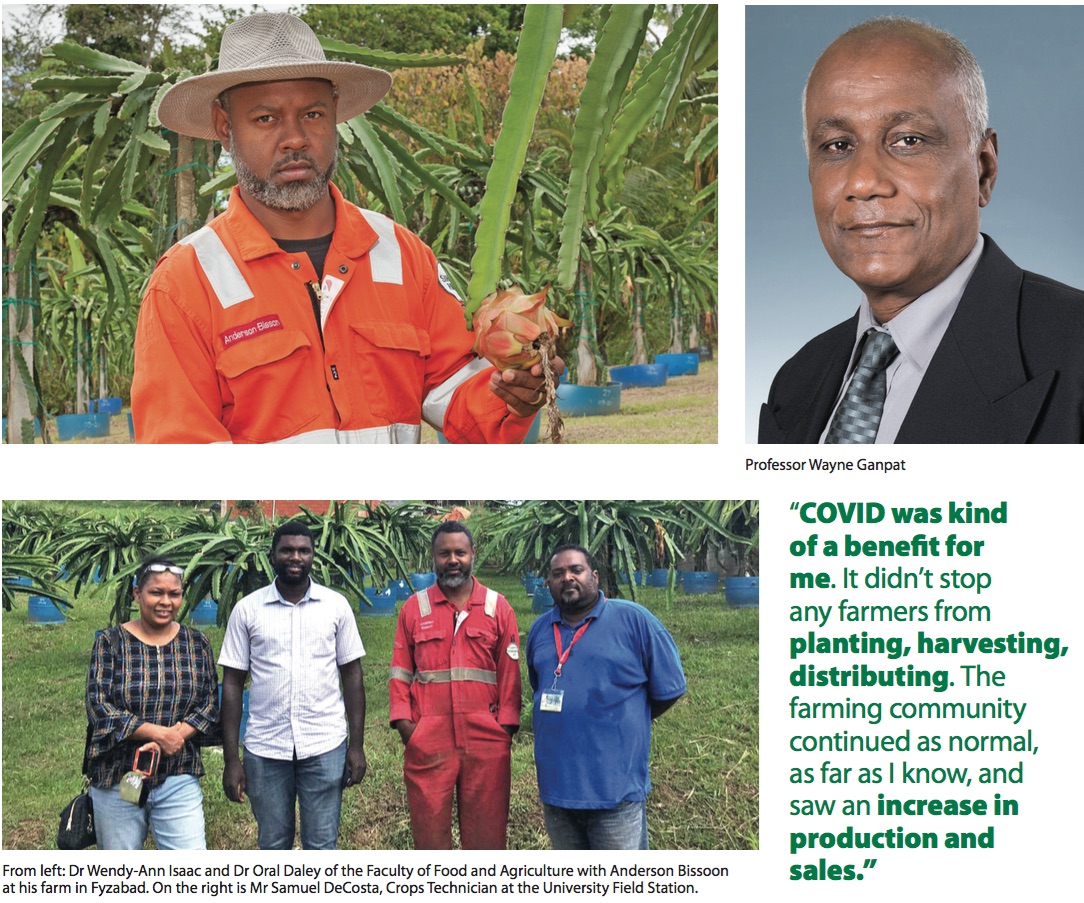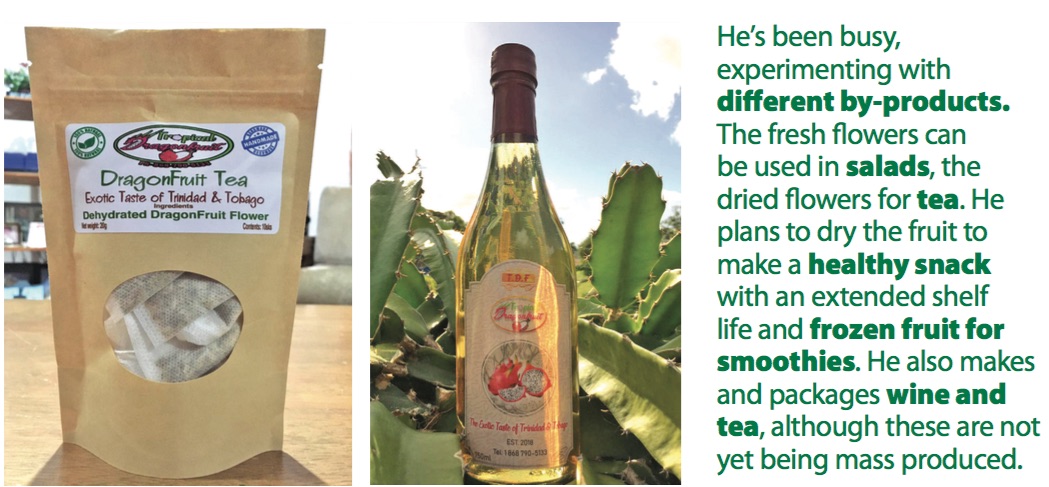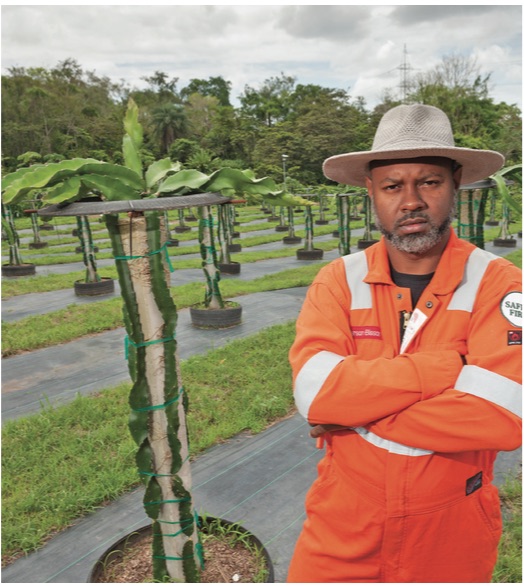Call it a hybrid history. An obsession with mythical dragons collided with COVID-19 job cuts to transform Anderson Bissoon, a first-year student at UWI’s Faculty of Food and Agriculture (FFA), into a leading dragon fruit pioneer in Trinidad and Tobago.
In 2017, Bissoon stumbled on the exotic plants at government nurseries in Centeno while shopping for fruit trees to plant on family land in Fyzabad. Intrigued by the evocative name, the Game of Thrones enthusiast decided to try and grow them, purchasing two, which he turned to four and continued propagating. With research, experimentation and ongoing guidance from FFA, he has since cut down all his traditional fruit trees, and now has over 1600 dragon fruit plants.
Dragon fruit is native to Central America, but has only recently started to become known in T&T. Bissoon compares the bright red fruit to “a big sorrel”. Multiple layers of skin overlap around a fleshy fruit with lots of tiny black seeds. The taste calls to mind pears and kiwi fruit. The climbing, cactus-like plants, with their large, fragrant blossoms, are trained on trellises.
“Dragon fruit is a climate-smart crop. That’s one of the reasons we are trying to promote it,” says Professor Wayne Ganpat, Dean of FFA. “It is a cactus, so it doesn’t require as much labour or water as some other fruits.”
For several years now, Professor Ganpat and the FFA have been some of the region’s most proactive advocates for re-igniting Caribbean agriculture. The FFA promotes and supports local agriculture through a host of programmes ranging from crop production, to alternative farming methods, to the business and marketing aspects of the food and agriculture industry. They host the annual techAGRI Expo (postponed in 2020 due to COVID-19) at the St Augustine Campus, an exhibition of farming technology, innovators and entrepreneurs. The faculty supports regional farmers and governments through their expertise, policy advice, training and research. One of their goals is to encourage a new generation of young and dynamic farmers, farmers like Anderson Bissoon.
At his farm in Fyzabad, Bissoon makes tall concrete posts, each supporting four plants. He says it was the novelty of the fruit, in combination with its health benefits and multiple earning stream opportunities that made him invest everything he had in this “make or break” venture. In fact, his previous experience was not in agriculture, but in oil. Over the course of 15 years, he worked in tech-oriented oilfield jobs, and with each new position he would seek academic knowledge and credentials to fit. Dragon fruit farming was no different: he applied at UWI to study for his degree in Agriculture. He was accepted, but deferred study because daily travel to St Augustine from Fyzabad seemed daunting.
When COVID-19 caused oilfield work opportunities to all but disappear, he took the opportunity to take his place at UWI, where online classes were now the order of the day.
“COVID was kind of a benefit for me. It didn’t stop any farmers from planting, harvesting, distributing. The farming community continued as normal, as far as I know, and saw an increase in production and in sales.”

His wife Candis, his children, mother and other family members are now his main helpers, and the farm is officially named Tropical Dragon Fruit.
He’s been busy, experimenting with different by-products. The fresh flowers can be used in salads, and the dried flowers for tea. He plans to dry the fruit to make a healthy snack with an extended shelf life and frozen fruit for smoothies. He also makes and packages wine and tea, although these are not yet being mass produced.
“It’s kind of limitless,” he says. “Dragon fruit is just a whole new flavour, for ice cream, for sorbet, a new flavour in everything that you could possibly want. And the colour attracts people as well – that particular variety that’s red or magenta on the inside. We can explore limitless possibilities.”
The fruit is also rich in iron, vitamins, antioxidants and gut-friendly probiotics. It’s high in fibre, and reputed to help lower blood sugar levels and blood pressure.
The business sells fruit to wholesalers, and in the off-season sells young plants. He has seen increased interest, with over 500 young plants sold to customers since Christmas, “and the fruit is always in demand, we can’t seem to provide enough”.
Professor Ganpat sees great potential in dragon fruit: “There is growing demand for it in the exotic fruit market. People’s tastes and preferences change, and they seem to have become very taken with the dragon fruit in Trinidad over the last couple years since it was introduced.”
The Dean of FFA says dragon fruit cultivation could help with local nutrition security (the production of a wide arrange of foods which provide essential nutrients). The fruit can also contribute to import substitution as a locally grown fruit that can replace foreign fruits.
“Consumers can get it from the farm to their tables in a shorter time,” says Professor Ganpat. Even Clarence Rambharat, Minister of Agriculture, Lands and Fisheries, has taken note of the farm’s initiatives. In November last year, he visited, posting on social media: “Tropical Dragon Fruit’s investment in this in-demand fruit is heartwarming, and signals the strength of local agriculture and the prospects for growth.”

Bissoon has sought the assistance of the Agriculture Ministry in the form of the Agriculture Incentive Grant to further expand his farm. After the Minister’s visit he was informed that he was approved for funding. He continues to slowly expand as he awaits the disbursement of funds by the Ministry.
Bissoon has high praise for his academic training at the FFA: “I think I have the best lecturers”.
He says, “I’m learning a lot. There are things we think we know about agriculture, but we don’t know the ‘why and the how’. UWI has taught me those things and now I have a greater appreciation for agriculture. It has broadened my way of thinking about food security. I think we are trying to pick ourselves up from a bad place, and the solution for that is the new generation of farmers as young entrepreneurs.”
The FFA is more than happy to support Bissoon and other student farmers.
“Producing a new generation of farmers has become a heightened focus of the faculty; ones who are innovative and business-oriented,” says Dean Ganpat. “Anderson is certainly benefitting from this renewed effort. The FFA continues to support the industry through its Agribusiness and Entrepreneurship programmes and this bold initiative is certainly worthy of our full support.”

He adds, “The on-going COVID-19 pandemic has ignited several other students, past and present, to engage in business activities to meet food and nutrition security goals. We salute all our success stories!”
To provide assistance, two members of staff, Dr Oral Daley (lecturer in Crop Science) and Dr Wendy-Ann Isaac (Deputy Dean of Graduate Studies, Research and Innovation), recently visited the farm. Bissoon is now working in collaboration with the FFA to supply The UWI crop museum with different varieties of the dragon fruit. He volunteered to help set up the area for these new varieties at the University Field Station.
Of his new occupation as dragon fruit farmer, he says, “I’m proud and happy to contribute to the development of UWI and the dragon fruit industry in Trinidad. The country can reach very far with this.”